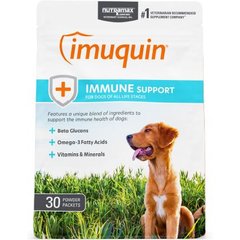5 Pet Safety Tips for Taking Your Dog to the Beach
PetMD Editorial
5 Pet Safety Tips for Taking Your Dog to the Beach
By Helen Anne Travis
The beach is a place to relax and have fun. And for many pet owners, bringing your dog to the beach or taking them to a dog beach makes for an even more relaxing and fun beach day experience. But the very things that make the beach so pleasant—the water, sun and sand—could also prove harmful to your pet.
Here are five pet safety tips to help keep your dog safe at the beach.
1. Keep Them Cool to Avoid Heatstroke
Protect your dog from heat exhaustion and heatstroke, says Dr. Libbie Fort, a veterinarian at Pekin Veterinary Clinic in Pekin, Illinois. This is especially important during the summer months. “These conditions can be fatal,” says Dr. Fort.
To keep your dog safe, avoid the dog beach at the hottest parts of the day, and provide your pup with plenty of access to shade and fresh, cool water. Try to keep activity to a minimum, says Dr. Fort. Sure, you can play fetch with your dog—just make sure they have plenty of time to rest, get out of the sun and drink water in between games.
If your dog seems overly tired or is panting more than normal, it’s a good idea to wrap up the day early and get them into the air conditioning, says Dr. Fort.
But if your dog is exhibiting symptoms like extreme lethargy, excessive panting, red (rather than pink) mucous membranes, diarrhea and vomiting, bring them to a vet immediately. Those could be signs that the dog is suffering from extreme heat stress.
5 Pet Safety Tips for Taking Your Dog to the Beach
 Nutramax Imuquin Immune Support Powder Immune Supplement for Dogs, 30 countRated 4.6 out of 5 stars77Reviews$24.99Chewy Price
Nutramax Imuquin Immune Support Powder Immune Supplement for Dogs, 30 countRated 4.6 out of 5 stars77Reviews$24.99Chewy Price Purina Pro Plan Veterinary Diets FortiFlora Powder Probiotic Digestive Supplement for Dogs, 30 countRated 4.8 out of 5 stars9447Reviews$30.99Chewy Price
Purina Pro Plan Veterinary Diets FortiFlora Powder Probiotic Digestive Supplement for Dogs, 30 countRated 4.8 out of 5 stars9447Reviews$30.99Chewy Price Purina Pro Plan Adult Sensitive Skin & Stomach Salmon & Rice Formula Dry Dog Food, 16-lb bagRated 4.4 out of 5 stars13KReviews$54.48Chewy Price
Purina Pro Plan Adult Sensitive Skin & Stomach Salmon & Rice Formula Dry Dog Food, 16-lb bagRated 4.4 out of 5 stars13KReviews$54.48Chewy Price Virbac Epi-Otic Advanced Ear Cleaner for Dogs & Cats, 4-fl oz bottleRated 4.7 out of 5 stars2541Reviews$12.34Chewy Price
Virbac Epi-Otic Advanced Ear Cleaner for Dogs & Cats, 4-fl oz bottleRated 4.7 out of 5 stars2541Reviews$12.34Chewy Price
3. Keep Them Safe in the Water
Another pet safety item for your pre-beach to-do list is to “Let your dog practice her swimming skills in a controlled environment,” says Dr. Robert Trimble, co-founder and head of veterinary services at Fuzzy Pet Health in San Francisco. You want her to feel confident in the water before exposing her to the tides and currents at the beach.
Take a look at the tide charts—in some regions, the size of the waves can vary drastically based on the time of year—and avoid days when the currents are strong, says Dr. Trimble.
Consider putting even good swimmers in a flotation device, says Dr. Fort. A dog life jacket with a chin support flap and bright colors can help keep pups safe in the water. And always keep a close eye on your pup when she’s off-leash. “Never turn your back on the ocean,” says Dr. Trimble.
4. Get the Right Sun Protection
Dog sunscreen and wipes are specially formulated for dogs to protect your pup from the sun without exposing her to potentially harmful ingredients like zinc, which is often contained in sunscreen made for people.
Apply dog sunscreen to areas like the nose and ears, where the fur is thinner, says Dr. Fort.
“Anything pink and hairless is at risk for sunburn,” says Dr. Trimble. He recommends rubbing the dog sunscreen in thoroughly and letting it dry before bringing your dog outside. ”You don’t want to just slather it on and walk away.”
After your dog beach day, check your pup for signs of sunburn, including red and inflamed patches. While you’re checking your dog’s skin, you should also make sure their eyes weren’t irritated by the sun or sand, says Dr. Fort.
If their eyes are goopy or they’re squinting more than usual, bring them to the vet. “It’s better to be safe than sorry,” says Dr. Fort.
5. Protect Your Pups From Parasites
A day on the beach can expose your pet to harmful bacteria and parasites. The pools that form along the shore could be a breeding ground for bacteria that cause diseases like leptospirosis, which could lead to kidney failure, says Dr. Trimble. Don’t let your dog wade through or drink from stagnant pools of water.
There is a vaccine to help prevent leptospirosis, says Dr. Trimble. Consider talking to your veterinarian to see if it’s appropriate for your pup.
Staying up to date with dog flea and tick prevention also keeps your dogs safe if they have to walk through any woods or vegetation on their way to the dog beach. And don’t forget their heartworm medicine, says Dr. Trimble.
“It only takes one mosquito to pass heartworm disease to your dog,” he says.